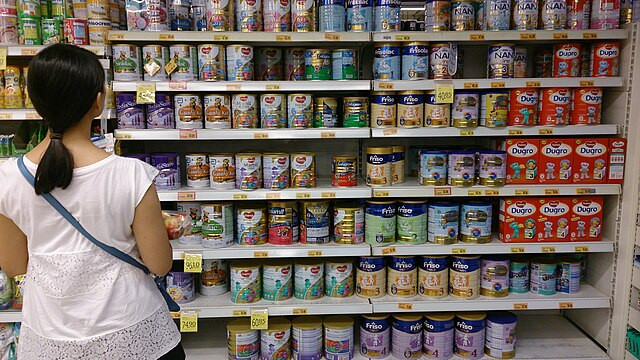Several popular infant formulas contain potentially harmful levels of lead, arsenic, and other contaminants, according to a new investigation released Tuesday by Consumer Reports. While most formulas tested showed no cause for concern, the report identified elevated levels of toxic substances in a handful of products, sparking renewed calls for regulatory scrutiny.
Consumer Reports tested 41 powdered infant formulas across a range of brands, including major names like Similac and Enfamil, as well as store brands and imported options. Among the findings:
- Lead: Detected in 34 out of the 41 formulas, with levels ranging from 1.2 to 4.2 parts per billion (ppb). The highest lead level was found in Enfamil Nutramigen formula, followed by Neocate Hypoallergenic formula. Eighteen formulas had lead concentrations that reached 50-100% of California's Maximum Allowable Dose Level (MADL) for reproductive toxicity.
- Arsenic: The highest levels of inorganic arsenic, a known carcinogen, appeared in Abbott Nutrition's EleCare Hypoallergenic (19.7 ppb) and Similac Alimentum (15.1 ppb), both exceeding the Environmental Protection Agency's drinking water limit of 10 ppb. Eight formulas surpassed Consumer Reports' own risk threshold.
- PFAS: Per- and polyfluoroalkyl substances were present in nearly all formulas tested. Several products contained PFOS, a legacy PFAS chemical linked to health risks.
- BPA and Acrylamide: Found in one formula-Enfamil Nutramigen, commonly recommended for infants with milk sensitivities. BPA is a recognized endocrine disruptor, while acrylamide is classified as a likely carcinogen by the EPA.
Consumer Reports emphasized that while contaminants occur naturally in soil, water, and food, efforts should be made to reduce levels in infant formulas as much as possible. "Parents shouldn't have to worry that the infant formula they are feeding their newborn might contain toxic chemicals that could endanger their young child's health," said Brian Ronholm, director of food policy at Consumer Reports. The organization urged Health and Human Services Secretary Robert F. Kennedy Jr. to ensure the FDA is adequately resourced to protect infant formula safety.
Formula manufacturers pushed back against the report. Abbott, the maker of Similac, stated, "Abbott's infant formulas are safe, and parents can use them confidently." The company argued that heavy metals naturally occur in the environment and are found in low levels in all food, including fruits, vegetables, and even breast milk. Abbott added that its formulas meet safety regulations set by the European Commission and Health Canada, and undergo stringent testing protocols.
Mead Johnson Nutrition, maker of Enfamil, also disputed Consumer Reports' findings. "We employ stringent testing protocols for heavy metals, and our acceptable ranges ensure compliance with all major international regulations including the U.S. FDA," the company said in a statement. Mead Johnson contended that its own testing contradicts Consumer Reports' results, particularly concerning the presence of BPA and acrylamide in Nutramigen.
Neocate similarly defended its product, saying in a statement, "The safety and quality of our formulas is of the utmost importance, and we can say with confidence that our Neocate formula is safe for babies to consume." The company added that heavy metals are naturally present in air, water, and soil, and that mixing the powdered formula with water per instructions would dilute already minimal trace levels.
In response to mounting concerns, the FDA announced Tuesday a new initiative called Operation Stork Speed, aimed at enhancing safety oversight of infant formula. The plan includes:
- Comprehensive review of formula nutrients.
- Increased testing for heavy metals and contaminants.
- Ongoing allowance for individuals to import infant formula for personal use.
- Collaboration with the National Institutes of Health to fill research gaps related to formula feeding and health outcomes.
Health and Human Services Secretary Robert F. Kennedy Jr. unveiled the initiative, citing the need for improved inspection protocols and supply chain resiliency, particularly in light of the 2022 nationwide baby formula shortage following an Abbott recall and facility shutdown.
Scott Stoffel, divisional vice president of external communications at Abbott, voiced support for the FDA's plan, stating, "We look forward to working with the secretary, the FDA, and the scientific and medical communities to continue to make infant formulas even closer to breast milk and support the aims of Operation Stork Speed."
The FDA has previously conducted limited testing of infant formulas under its Total Diet Study, reporting low or non-detectable levels of lead, arsenic, and PFAS. However, the agency acknowledged the need for expanded data collection and recently initiated a broader survey in 2023, though results have not yet been released.
Consumer Reports encouraged parents not to panic, but to speak with pediatricians before switching formulas. Dr. Mark Corkins, professor of pediatrics at the University of Tennessee Health Science Center, noted, "There's always been some different low-level of contamination in the food we eat anyway. The only worry is if the levels are too high." Corkins warned parents against attempting to make their own formula, stressing the importance of proper nutrition concentrations.






